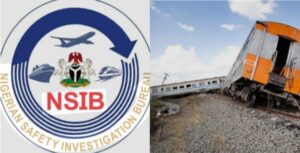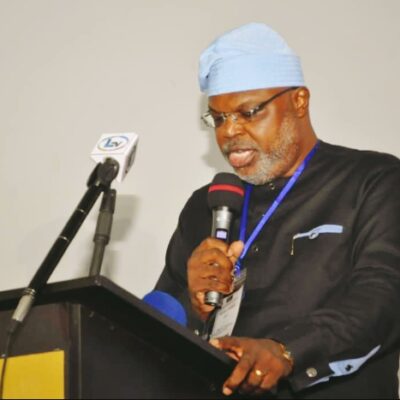
BY OLAPEJU OLUBI
The Nigerian Safety Investigation Bureau (NSIB) has confirmed that it has launched a full-scale investigation into the derailment of a Kaduna-bound passenger train which occurred at approximately 11:09 a.m. on Tuesday, August 26, 2025.
The incident took place at Kilometer 49, between Kubwa Station and Asham Station, along the Abuja–Kaduna rail corridor.
According to preliminary reports, six passengers sustained varying degrees of injury, while no fatalities have been recorded so far.
Emergency responders were immediately dispatched to the scene to provide medical attention to the injured, while safety teams secured the area to prevent further harm.
In a swift response to the incident, NSIB deployed a “go-team” of investigators to the site. Their mandate, the Bureau explained, is to gather evidence, interview relevant stakeholders, document the scene, and commence a rigorous investigation into the technical, human, and systemic factors that may have contributed to the derailment.
“The Bureau’s primary objective is to determine the root cause of this accident, not just at a superficial level, but by examining both the immediate and underlying issues that led to it.
“The findings will guide the issuance of safety recommendations that can prevent a recurrence and improve rail safety standards nationwide”, said Mrs. Bimbo Olawumi Oladeji, Director of Public Affairs and Family Assistance, NSIB.
The Bureau expressed sympathy to passengers and families affected by the incident, pledging its full support during the period of investigation.
“We extend our thoughts to those who sustained injuries and assure the traveling public that we are committed to upholding their safety through independent and transparent investigative processes,” Mrs. Oladeji added.
Speaking further on the incident, the Director General of NSIB, Captain Alex Badeh Jr., reiterated the Bureau’s mandate to enhance transportation safety across all modes of travel in Nigeria.
“We deeply sympathise with all who sustained injuries. The Bureau has deployed investigators to the site to ensure the root cause of this derailment is uncovered. Our commitment is to ensure safer rail transport for Nigerians through a transparent and independent investigation”, he said.
He emphasised that while accidents are sometimes inevitable in transportation, what matters most is how effectively the system responds to them, learns from them, and implements corrective measures.
“This is why our investigation will leave no stone unturned. Every possible factor, infrastructure, rolling stock, operational procedures, and even external influences, will be scrutinised,” he noted.
The Abuja–Kaduna railway line is one of the busiest in the country, serving as a vital link between the Federal Capital Territory and the North-West.
The route, however, has faced several challenges in recent years, including previous disruptions caused by security breaches and infrastructure issues.
Safety experts believe that the outcome of NSIB’s investigation will be critical in restoring public confidence in the rail service and ensuring that similar incidents do not occur in the future.
The Bureau assured the public that the investigative process will remain independent of any external influence, stressing that its final recommendations will be guided solely by evidence, technical analysis, and global best practices in railway safety management.
“The NSIB will provide updates as the investigation progresses, and its final report will be made public. This reflects our commitment to transparency and accountability in ensuring the safety of Nigerians who rely on rail transport for their daily mobility and economic activities”, the Bureau noted.
The NSIB encouraged the traveling public to remain confident in Nigeria’s rail system, stressing that lessons learned from such incidents ultimately strengthen safety measures.
The Bureau also reminded stakeholders in the transport sector, operators, regulators, and service providers, that safety is a collective responsibility requiring continuous vigilance, investment and adherence to global standards.
Olapeju is a journalist and aviation reporter.





